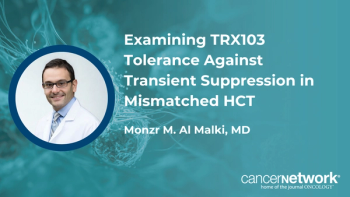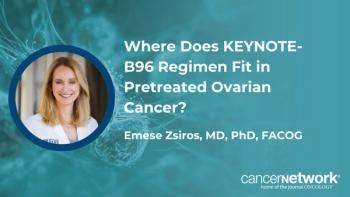
Salma Jabbour, MD, on AEs Observed With Pembrolizumab Plus Concurrent Chemoradiotherapy in Stage III NSCLC
The chief of Gastrointestinal Radiation Oncology at the Rutgers Cancer Institute of New Jersey discussed the adverse events associated with the use of pembrolizumab plus concurrent chemoradiation therapy in patients with unresectable, locally advanced, stage III non–small cell lung cancer.
Results from the ongoing KEYNOTE-799 study (NCT03631784) presented at the IASLC 2020 World Conference on Lung Cancer (WCLC) Singapore demonstrated promising safety and efficacy with the use of pembrolizumab (Keytruda) plus concurrent chemoradiation therapy in patients with unresectable, locally advanced, stage III non–small cell lung cancer (NSCLC).
With approximately 15 weeks of follow-up, previous interim results demonstrated an overall response rate (ORR) of 67.0% in cohort A, which contained patients with both squamous and nonsquamous NSCLC, and 56.6% in cohort B, which consisted of only patients with nonsquamous NSCLC.
In this analysis, conducted after an additional 6 months of follow up, the ORR for cohort A (n = 112) was 69.6% (95% CI, 60.2-78.0), with 4 patients (3.6%) showing a complete response (CR). The median duration of response (DOR) for this patient population was not reached; however, 82.2% of patients (n = 31) showed a DOR of 12 months or greater.
Response rates in cohort B (n = 61) were similar, with an ORR of 70.5% (95% CI, 57.4-81.5), including 3 patients (4.9%) who achieved a CR. Median DOR was not yet reached, though 72.1% (n = 5) of patients showed a DOR of 12 months or greater.
The median time to response was 2.1 months (range, 1.1-7.6) for cohort A and 2.2 months for cohort B (range, 1.8-10.3).
In an interview with CancerNetwork®, Salma Jabbour, MD, chief of Gastrointestinal Radiation Oncology at the Rutgers Cancer Institute of New Jersey, discussed the adverse events associated with the use of pembrolizumab plus concurrent chemoradiation therapy in patients with unresectable, locally advanced, stage III NSCLC.
Transcription:
One of the primary end points of this study was the incidence of grade 3 or higher pneumonitis, and this was found to be 8% in arm A and 7.9% in arm B. And the implications of this are that these were relatively expected results in using the established known toxicity profiles of pembrolizumab monotherapy and the known toxicity profiles of concurrent chemoradiotherapy, and what we would expect when we combine these therapies at the same time.
Reference:
Reck, M. Lee KH, Frost N, Kowalski DM, et al. Pembrolizumab plus platinum chemotherapy and radiotherapy in unresectable, locally advanced, stage III NSCLC: KEYNOTE-799. Presented at the the International Association for the Study of Lung Cancer 2020 World Conference on Lung Cancer (WCLC) Singapore; January 28-31, 2021; Virtual. Abstract OA02.03.
Newsletter
Stay up to date on recent advances in the multidisciplinary approach to cancer.










































